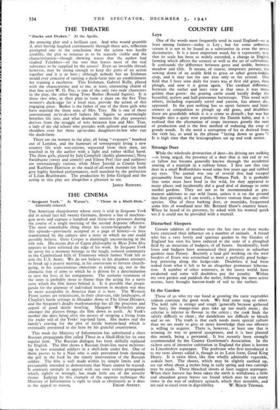THE CINEMA
"Sergeant York." At Warner's. "Three in a Shell-Hole."
Generally released.
THE American sharpshooter whose story is told in Sergeant York did in actual fact kill twenty Germans, destroy a line of machine- gun nests and capture a hundred and thirty-two prisoners during the course of a single morning of the second Argonne offensive. The most remarkable thing about his screen-biography is that this episode—previously accepted as a page of history—is here transformed by the camera into a story in which no one could possibly believe. Gary Cooper is alarmingly unconvincing in the title role. His recent diet of Capra philosophy in Meet Yohn Doe appears to have softened the edge of his work. In Sergeant York he never for a moment belongs to the tough, isolated community in the Cumberland hills of Tennessee which farmer York left to join the U.S. Army. We do not believe in his drunken attempts to break up a prayer meeting, in his conversion to fervent church- going, in his conscientious objections to joining up, nor in the climactic feat of arms to which he is driven by a determination to save the lives of his companions. The scenario treatment of the story is probably more to blame than the acting for a nasty taste which the film leaves behind it. It is possible that propa- ganda for the glamour of individual heroism in modern war may be more acceptable in America than it is here. The Western Front scenes are reminiscent, in their clear-cut, tidy landscapes, of Chaplin's battle settings in Shoulder Arms or The Great Dictator, and the Sergeant's deadly marksmanship has all the precision and appeal of good skittle bowling. Margaret Wycherley alone amongst the players brings the film down to earth. As York's mother she does bring alive the misery of scraping a living from the rocky soil of the Yorks' top-land farm. She makes real the family's craving for the plot of fertile bottom-land which is eventually presented to the hero by his grateful countrymen.
This week the Ministry of Information has substituted a short Russian propaganda film called Three in a Shell-Hole for its own regular item. The Russian dialogue has been skilfully replaced by English. The film shows a Russian front-line nurse minister- ing to two wounded soldiers in a shell-hole under fire. One of them proves to be a Nazi who is only prevented from shooting the girl in the back by the timely intervention of the Russian soldier. The film is well made within its simple limits and is presumably intended to demonstrate that Nazis cannot be trusted. It contrasts strongly in appeal with our own screen propaganda which, rightly or wrongly, has made little use of the atrocity theme. Judging by this example of the opposite technique the Ministry of Information is right to stick as obstinately as it does






















 Previous page
Previous page